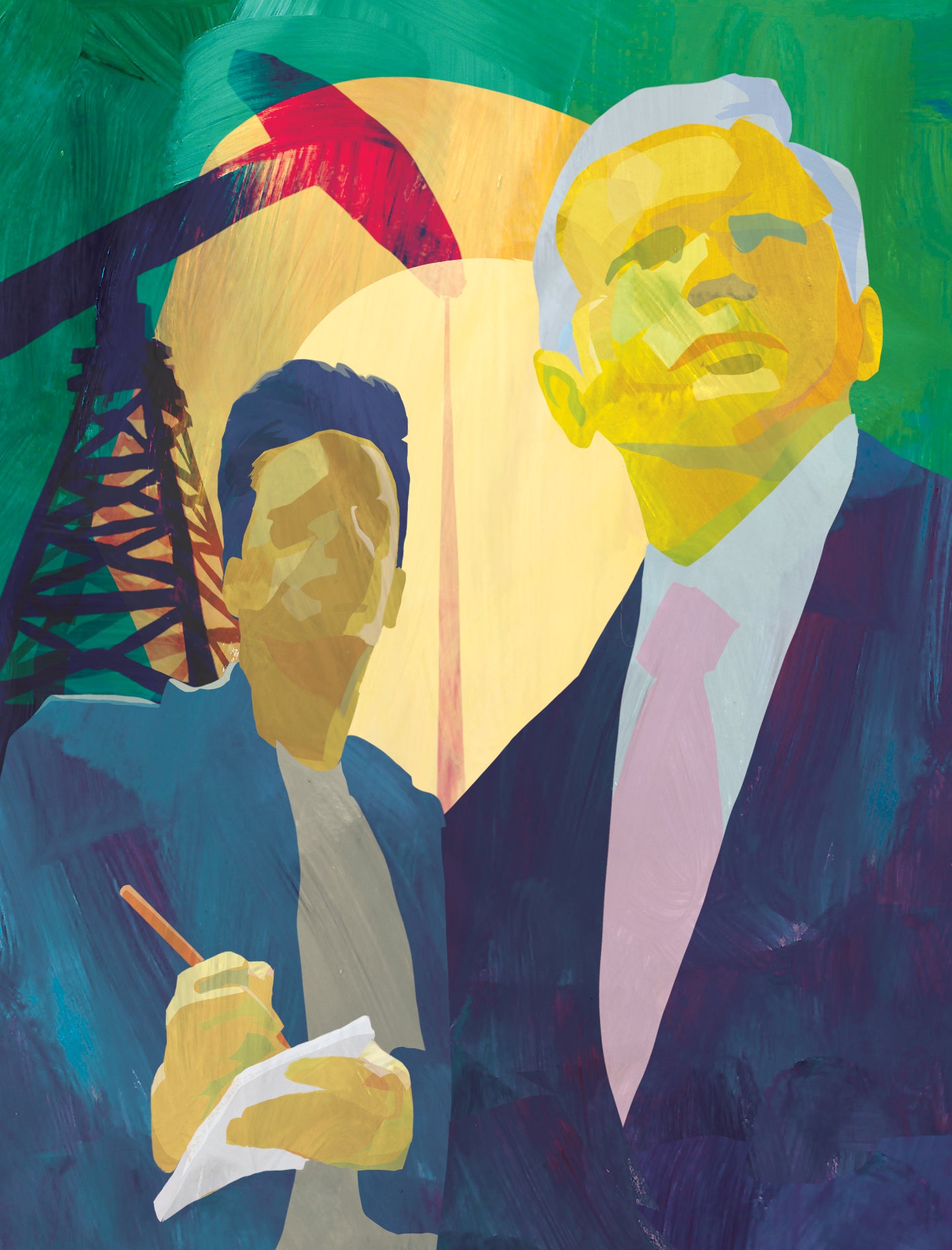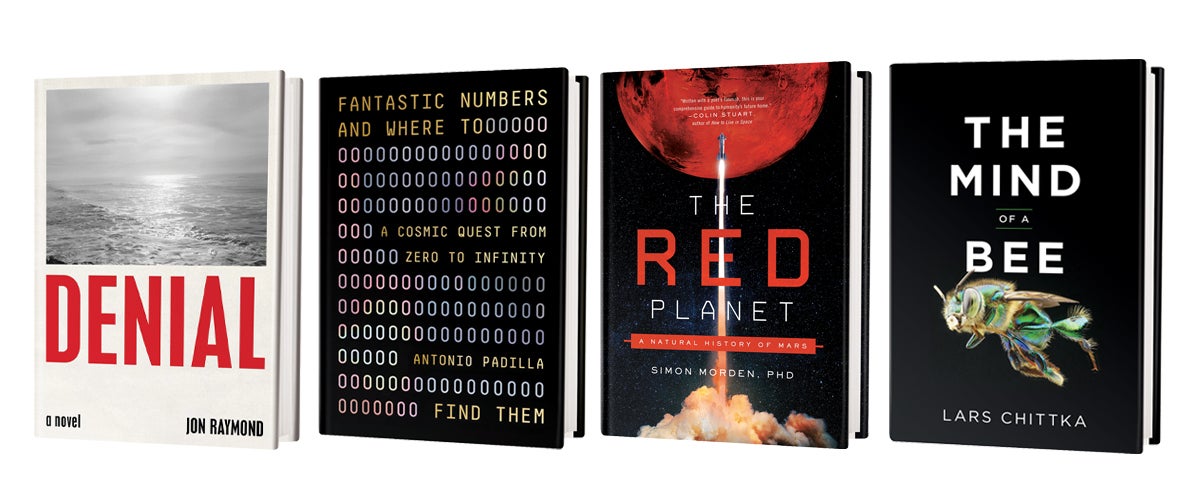[ad_1]
Fiction
Energy on Trial
In a future the place folks maintain the perpetrators of the local weather disaster to account, what has modified?
Denial: A Novel
by Jon Raymond
Simon & Schuster, 2022 ($26)
Writing science fiction is usually a type of activism. The act of writing fiction typically could be stated to spring from a spot of hope—a celebration of what’s finest in us, an try and think about a much less horrible actuality. However most genres lack the audacity to scrap the principles of physics and know-how to create worlds the place the seemingly intractable issues of immediately could be solved or reworked so dramatically that we put aside our preconceived notions to embrace a recent perspective.
Because of this storytelling performs such an important function within the struggle to discover a approach out of the local weather disaster. If we’re going to make the large sacrifices which can be wanted—if we’re going to vary as a species, in different phrases—we’ll have to switch our previous, outdated narratives. That’s the facility of nice activism.
Jon Raymond’s Denial is premised on this sort of radically hopeful outlook. It’s set in a future that’s been devastated by local weather change—however not as badly because it might have been, due to the sort of unified, troublesome, transformative change that our present world appears so incapable of constructing. Protest actions have efficiently damaged the facility of the businesses that profited from environmental devastation, and the executives who masterminded such exploitation had been placed on trial and locked up for all times.
I would like so badly to imagine on this future, that we will change our habits and maintain the worst profiteers accountable. However Denial doesn’t go far sufficient to persuade me that it’s potential. Oddly, the world itself appears too acquainted and even banal, though we’re repeatedly assured that massive shifts have taken place. There are occasional references to distant wildfires and hologram communications, however espresso outlets, basketball video games and street journeys all stay unchanged. At one level the protagonist’s automobile breaks down in a small Mexican village, and he’s unable to meaningfully talk with Spanish audio system. But the know-how for easy (if imperfect) translation already exists on each smartphone, and the truth that Raymond missed this chance to think about a future with practical particulars is certainly one of many obvious distractions.
I can recognize the need to current a world that’s related sufficient to our personal—to attach the dots between the awful current and a situation the place solely the worst outcomes had been averted. However actually any forces which can be sturdy sufficient to crumble buildings of energy would shift tradition and progress as effectively.
It has been stated that style is a dialog, and anybody is welcome to affix in at any level. Denial is Raymond’s fourth novel and appears to be his first work of science fiction. A few of my favourite works of speculative fiction, as an example, are by style outsiders, akin to Kazuo Ishiguro’s By no means Let Me Go and Colson Whitehead’s The Underground Railroad. However in the event you’re dropping right into a dialogue that has a wealthy historical past, contributions that may appear compelling and new to it’s possible you’ll have already got been mentioned at size. The impression one will get is of a author excited in regards to the prospects and historical past of the style however not clued in to its numerous current.
Ultimately, the e-book’s largest problem is just not a matter of style however of character. The protagonist is a journalist who tracks down one of the infamous company executives who escaped punishment—a sort of local weather change model of Eichmann in Argentina—and befriends him to nail him with a spectacular on-camera confrontation and arrest. I really like this recent idea, exploring how we might maintain folks accountable for crimes towards the planet.
The issue is, our journalist narrator doesn’t give a lot consideration to the underlying points at stake. He grapples within the summary with the ethics of sentencing a sort previous man to die in jail whereas acknowledging that the person deserves to be punished. However he himself has no sturdy emotions on the bigger themes of local weather destruction or the ambivalence many people really feel towards radical, mandatory change. If he’d hated the previous govt’s guts or believed that punishing people for collective habits is profoundly fallacious, I’d have cared extra in regards to the character and his arc. However his motivation feels flimsy. Given the promising plot, the expertise of watching it unfold is curiously empty.
Local weather fiction (usually shortened to “cli-fi”) is its personal style now, with many emotionally resonant novels and brief tales that efficiently think about higher futures and impress readers to motion. Latest books akin to Claire North’s Notes from the Burning Age and Becky Chambers’s A Psalm for the Wild-Constructed have imagined vibrant, stunning—and arduous, troubling—futures whereas rooting us in a vibrant central character who needs and feels issues so strongly that the reader does, too. In these worlds, humanity has modified at an incredible value and after nice struggling whereas retaining a robust familiarity. That is the thrilling stress that one of the best tales in regards to the local weather disaster navigate effectively: Which components of “human nature” are immutable, and that are socially decided and topic to vary?
We’d like extra courageous books like Denial that think about a future that’s not dystopic—however that may present us how we’d get there and who we’ll grow to be once we do.

Nonfiction
Vigorous Numbers
Discovering awe in unsolved equations
Fantastic Numbers and Where to Find Them: A Cosmic Quest from Zero to Infinity
by Antonio Padilla
Farrar, Straus and Giroux, 2022 ($30)
Cosmologist Antonio Padilla’s Implausible Numbers and The place to Discover Them is an distinctive compilation of recent arithmetic and its real-world functions. Nothing is clearer than Padilla’s love for his work, which will likely be notably inviting to put readers. In a topic that may trigger some eyes to glaze over, it is a fast-paced and dramatic telling of the historical past of arithmetic that’s finally involved with convincing us why we should always care. As Padilla guides readers from the imperceptibly small numbers (what does 10−120 actually appear like?) to the existentially giant ones (the speed of enlargement of our recognized universe) that encompass, bump up towards and bounce off us all, he performs the herculean activity of not getting misplaced within the trivialities.
Conceptualizing the real-world software of summary arithmetic is each professor’s dream for his or her college students, and Padilla makes it a actuality. In conversational type, he jokes with the reader, continuously making colloquial asides and drawing photos—utilizing twin sea snakes, as an example, to painting frequency in electromagnetic radiation. Padilla bends mild by way of Jell-O, explains entropy by invoking the soccer rivalry between Manchester and Liverpool, and walks us by way of Max Planck’s work by referencing Squid Recreation, the massively standard Korean TV sequence.
Readers are urged to think about heady ideas such because the relativity of time by way of standard data (akin to Usain Bolt’s sprinting velocity)—however by no means with out steerage. Padilla takes nice effort to carry our arms by way of the discoveries he needs us to make; simply as we’re feeling existentially overwhelmed in imagining the squeeze of spacetime, he leads us to the uncertainty precept, for instance, with a punny line to guarantee us that we’ve safely made it to the end line. There is no such thing as a quantum entanglement to be discovered right here.
Physics and the mathematical equations we use to grasp our universe can appear nearly not possible, too massive or too small or too bizarre to be actual. However Padilla exhibits us there may be nothing extra thrilling than a math equation left unsolved: Is gravity actual? What does the floor of a black gap appear like, and is it really black? Is googol a quantity any precise layperson has ever wanted to make use of? Why are the solutions to those questions not so easy?
Perusing this e-book will depart readers with awe, sufficient enjoyable details for a lot of cocktail events, and a deep appreciation for mathematicians like Padilla who can clarify how understanding a googolplex leads us to the existence of doppelgängers. —Brianne Kane
In Transient
The Red Planet: A Natural History of Mars
by Simon Morden
Pegasus Books, 2022 ($26.95)
Considering outer area can simply as simply spark existential dread as it will probably incite surprise. However The Purple Planet, a geological and historic survey of our photo voltaic system neighbor, reads extra like a compelling journey information. Simon Morden, an award-winning science-fiction author with a doctorate in geophysics, embraces each these backgrounds with gusto whether or not he’s explaining the emergence of volcanoes on the planet or fantasizing about swimming in Martian saltwater. When the planet was in its infancy, Morden situates readers on the “ropey” and “blocky” floor; later in Mars’s life, mud storms create “a low susurrus of sound, a thousand whispers simply on the opposite facet of our spacesuit helmets.” The Purple Planet doesn’t break new floor by way of scientific findings (don’t anticipate massive scoops about life on Mars, as an example). However that is area writing at its best, laying out extraterrestrial mysteries and convincing us to care. —Maddie Bender
The Mind of a Bee
by Lars Chittka
Princeton College Press, 2022 ($29.95)
Advanced alien minds are throughout us and deserve extra of our curiosity and respect. That is the argument on the coronary heart of The Thoughts of a Bee, a radical and considerate primer on the interiority of bees. As soon as considered a easy, hive-minded species the place people function like cogs in a machine, bees are revealed right here to be deeply clever and able to wealthy sensory experiences. Latest work, for instance, signifies that they will image shapes and objects of their minds. Writer Lars Chittka pulls from his background as a behavioral ecologist, deftly weaving between historical past and first and secondary analysis to map the methods bees be taught in regards to the world round them, develop distinctive personalities, and maybe even perceive self and emotion. His reflections immediate questions on how bees are handled by people, making this intimate portrait of certainly one of Earth’s most essential species interesting to fanatics and researchers alike. —Mike Welch

[ad_2]
Source link


Recent Comments